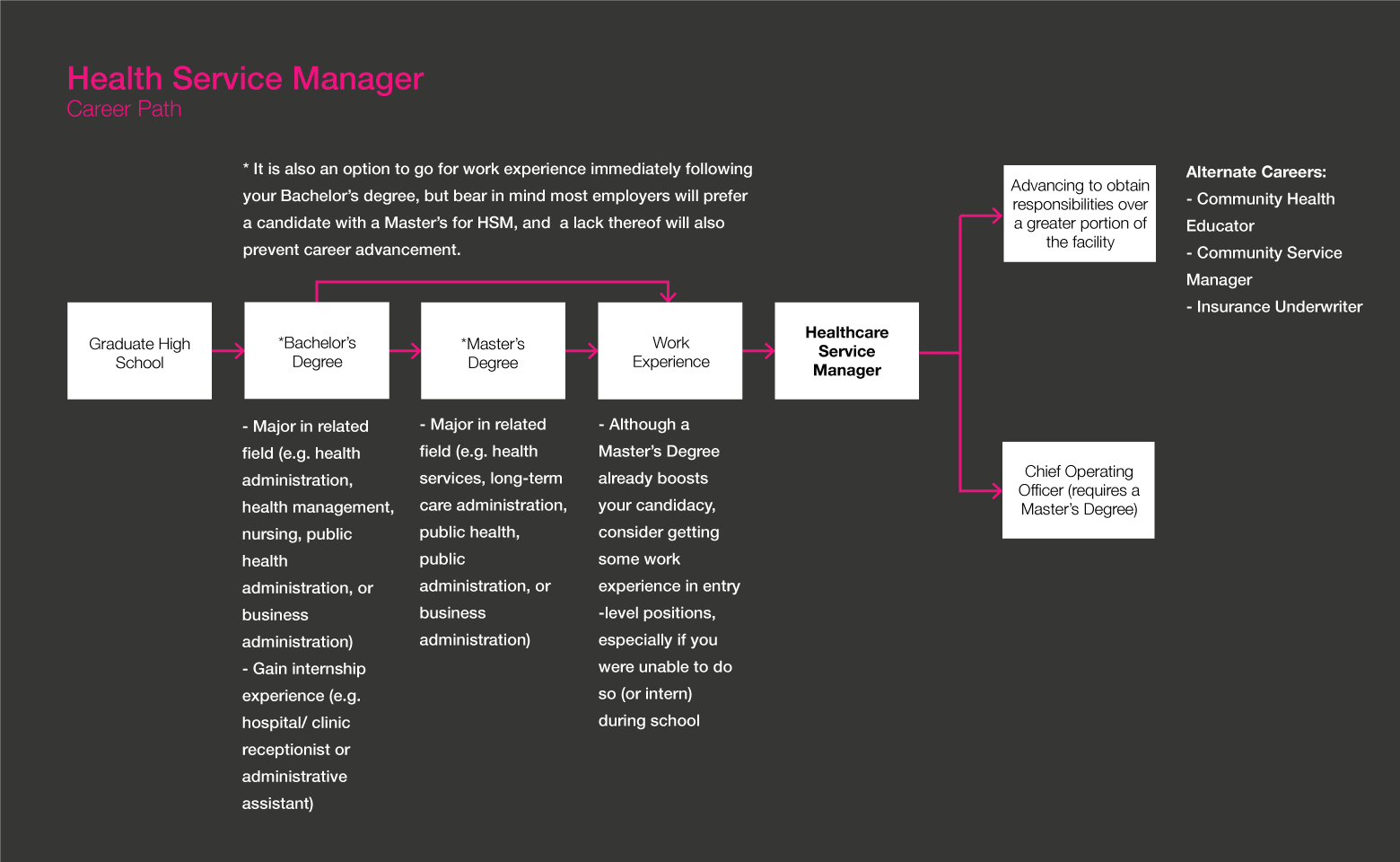Spotlights
- Healthcare Executives
- Healthcare Administrators
- Health Information Management Director
- Hospital Management Engineer
Health Service Managers are responsible for planning and directing the services provided in various healthcare organizations. Typically this career requires experience and knowledge in healthcare laws, regulations, and technology to improve the efficiency and quality of healthcare services at their facility.
- Employment security due to rapidly growing career field
- Meaningful work and making a real difference in the lives of customers
- Opportunities for career mobility
- Diverse job opportunities
- Overseeing fiscal operations:
- Manage the finances of the facility, such as patient fees and billing
- Prepare and monitor budgets and spending to ensure departments operate within funding limits
- Keep and organize records of the facility’s services, such as the number of inpatient beds used; also determining rates for services
- Making sure the facility adheres to the most current standards of medical and legal laws and regulations
*Note: The following responsibilities relate to the position of a Healthcare Administrator, but as these positions demand similar qualifications, often facilities (especially smaller ones) will expect an employee to take on tasks for both positions
- Supervising employees:
- Developing departmental goals and objectives
- Recruiting and training staff members
- Creating work schedules and assigning them to staff
- Keeping lines of communication with co-workers throughout the facility (beyond subordinates):
- Assembling reports to update management on plans for programs, services, and cost-cutting/quality enhancement
- Working with department heads and medical staff to gauge their needs and expectations
- Speaking for the facility at meetings with investors or on governing boards
Soft Skills
- Written and oral communication
- Critical thinking and analytical skills
- Decision-making
- Interpersonal and leadership skills
- Organization and time management (supervising, scheduling)
Hard Skills:
- Budgeting
- Customer billing
- Project management
Technical Skills
- Data management and query software: e.g. Microsoft Access, SQL
- Medical software: e.g. Epic Systems, MEDITECH software, electronic health record (EHR) systems
- Knowledge of advancements in healthcare technology and data analytics
- Hospitals
- Clinics
- Managed care organizations
- Public health agencies
- Medical practice for a group of physicians
→ Within these organizations, health service managers may coordinate an entire facility or a specific department
- Working long hours
- Working at odd hours due to on-call schedules at a healthcare facility
- Traveling to attend meetings or inspect satellite facilities (could be a positive aspect of the job too!)
- Cutting costs associated with operating a healthcare facility
- IT management skills highly desired in health service managers
- Use of social media to communicate with and educate current/prospective customers
- Increasing protection of patient privacy
- Health Services Managers need a bachelor’s at a minimum. A master’s can make candidates competitive for more jobs
- Common degree majors include health administration, health management, nursing, public health administration, or business administration. Typical courses include:
- Accounting
- Business management
- Health economics
- Health information systems
- Health services management
- Hospital organization
- Human resources administration
- Legal subjects and ethics
- Medical terminology
- Consider earning your bachelor’s from a program that’s been certified by the Association of University Programs in Health Administration (AUPHA)
- In addition to academics, employers may want to see proof of relevant healthcare work experience. Many Health Services Managers get started as health information techs or in records or admin jobs
- Depending on the facility being run, Health Services Managers may need to be licensed. For example, nursing home managers and sometimes assisted living facility managers to require licensure
- In some cases, a state or employer may want a worker to have a registered nurse or social worker license. Licensure requires passing a national exam and, in some states, a state exam
- Common optional certifications include:
- Professional Association of Health Care Office Management - Certified Medical Manager
- American Health Information Management Association - Registered Health Information Administrator
- Note, the American College of Health Care Administrators previously offered certifications for Nursing Home Administrators and Assisted Living Administrators, but they have discontinued these programs
- In high school, stock up on classes such as accounting, business, English, writing, communications, debate, healthcare, IT, and biology
- Take the tough classes that will prepare you for the rigors of college
- Volunteer for school projects where you can learn leadership, teamwork, and project management skills
- Run for office in school clubs and get engaged in healthcare-related community organizations through volunteer work or healthcare internships
- Try to gain relevant work experience to beef up your resume
- Keep a working draft resume and add to it as you complete various achievements, so you don’t forget anything
- Learn about other cultures and consider studying a foreign language if you plan to work in a diverse community
- Decide if you want to work in a hospital, clinic, assisted living facility, nursing home, or governmental office
- In college, check out professional organizations like Association of University Programs in Health Administration (AUPHA) to see what resources and opportunities are available
- Keep up to date on the latest developments in health services. Try to find a mentor who can guide you and offer tips
- Review job ads well in advance, to see what qualifications they’re looking for so you can tailor your studies accordingly
- Be familiar with Health Services-related programs for accounting, business intelligence, charting, cloud-based data access, compliance, computer-aided design (CAD), database management, development environments, enterprise resource planning (ERP), financial analysis, geographic information system (GIS), human resources (HR), materials requirements planning, presentations, process mapping, project management, and sales/marketing
- Harry J. Harwick Scholarship (for undergraduate/undergraduate students attending an ACEHSA or AUPHA accredited school, $5,000 award)
- Jack Kent Cooke Foundation Scholarships (for high school, undergraduate, and graduate students, up to $30,000 award)
- Corris Boyd Scholars Program (for graduate students who are minorities, $40,000 award)
- Further Resources

-
A Bachelor’s degree from a program certified by AUPHA (Association of University Programs in Health Administration) is especially well-recognized and requires completion of an internship in a healthcare setting, which can lead to employment following graduation
-
However, be sure to get your master’s degree and skills in healthcare IT systems to give yourself the best chances of employment as a health service manager
-
Membership and engagement in a professional organization can promote a resume and allow for networking opportunities
-
Apply to the various organizations where a health service manager would be employed (previously listed)
-
Professional organizations such as AUPHA may also list available jobs and aids in the job search (http://www.aupha.org/home)
- Confidence and experience to make firm decisions
- Diplomacy and effective communication to navigate various interests and lead a team effectively
Websites
- AAB - Board of Registry
- Academy of Nutrition and Dietetics
- American Academy of Health Physics
- American Academy of Medical Management
- American Academy of Professional Coders
- American Association of Bioanalysts
- American Association of Directors of Nursing Services
- American Association of Healthcare Administrative Management
- American College of Health Care Administrators
- American College of Healthcare Executives
- American Correctional Association
- American Health Information Management Association
- American Hospital Association
- American Medical Technologists
- American Nurses Association
- American Public Health Association
- American Society for Clinical Pathology
- American Society of Ophthalmic Administrators
- Association for Medical Imaging Management
- Association for the Advancement of Medical Instrumentation
- Association of Credit and Collection Professionals
- Association of University Programs in Health Administration
- Certification Board for Sterile Processing and Distribution
- Certification Commission for Drug and Alcohol Program Professionals
- Certification Commission for Healthcare Interpreters
- American Association for Physician Leadership
- College of Healthcare Information Management Executives
- Competency and Credentialing Institute
- Council for Certification in Volunteer Administration
- DRI International
- Healthcare Billing & Management Association
- Health Care Compliance Association
- Healthcare Financial Management Association
- Healthcare Information and Management Systems Society
- Healthcare Sterile Processing Association
- Health IT Certification
- International Association of Healthcare Security and Safety
- International Board for Certification of Safety Managers
- International Certification & Reciprocity Consortium
- ISC2
- LeadingAge
- Medical Group Management Association
- National Association Medical Staff Services
- National Association of Directors of Nursing Administration in Long Term Care
- National Association of Healthcare Access Management
- National Association of Health Unit Coordinators, Inc.
- National Board of Public Health Examiners
- National Commission on Correctional Health Care
- National Fire Protection Association
- Professional Association of Health Care Office Management
- Public Responsibility in Medicine and Research
- Regulatory Affairs Professionals Society
- Society for Clinical Data Management
- Society for Simulation in Healthcare
Books
- 101 Careers in Healthcare Management, by Leonard Friedman PhD MPH FACHE and Anthony R. Kovner PhD
- Healthcare Valuation, The Financial Appraisal of Enterprises, Assets, and Services, by Robert James Cimasi
- Shortell & Kaluzny's Health Care Management: Organization Design and Behavior, by Lawton Burns, Elizabeth Bradley, et al.
- Community Health Educator
- Community Service Manager
- Insurance Underwriter
Newsfeed

Featured Jobs

Online Courses and Tools








